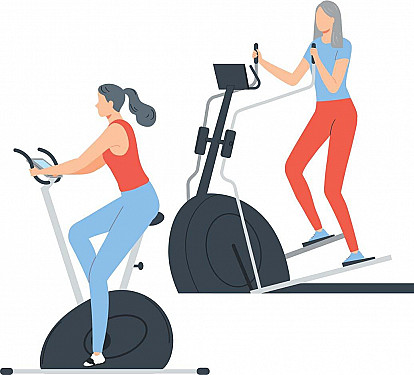Healthy brain aging: No strain, no gain
To keep your mental skills and memory in tip-top shape, take on new challenges, get out of your comfort zone, and be social.
Use it or lose it: How many times have you heard that timeworn principle of healthy brain aging? Scientists say that living a mentally active life is as important as regular physical exercise. Just as your muscles grow stronger with use, mental exercise keeps your mental skills and memory in tone.
But what kind of exercise is best for the brain? As with physical exercise, are certain kinds of "brain work" more effective than others? For some insight, we spoke to Dr. Anne Fabiny, chief of geriatrics at Cambridge Health Alliance and an assistant professor of medicine at Harvard Medical School.
Any brain exercise is better than being a total mental couch potato. But the activities with the most impact are those that require you to work beyond what is easy and comfortable—just as in physical weight lifting. Playing endless rounds of solitaire and watching the latest documentary marathon on the History Channel may not be enough. "If it's too easy," Dr. Fabiny says, "it's not helping you."
Be a lifelong learner
You spent the first half of your life building what brain scientists call "cognitive reserve." That equates with dense networks of connections between brain cells. Experience and learning build and maintain the connectivity.
"Learning new things is really important, because you are using mental skills that you would not otherwise," Dr. Fabiny says. "When you are actually learning something, you are creating new neural pathways. That's hugely important."
As you get older, you want to keep what you have and maintain your neural networks in the best working order.
Strain your brain
Scientists have found that a wide variety of mental activities seem to help preserve our cognitive reserve—from playing board games to juggling. The more challenging tasks can have the most impact.
Think of all "mental activities" as a continuum from watching a TV documentary (passive; mildly challenging) to taking a class to learn how to converse in a new language (active; very challenging). Taking on a challenge like acquiring new language skills can be very difficult, but the benefits are greater, too.
"Don't just go to the library and learn new things that way," Dr. Fabiny says. "Be open to new experiences that cause you to see the world and do things differently."
Get uncomfortable
Being challenged sometimes means being uncomfortable. One stereotype of aging is that young people are bold explorers but older people are timid homebodies who "know what they like." Stereotype though it may be, it is easy to get in a rut.
"Over time, some people may become less confident, and learning new things becomes scary and intimidating," Dr. Fabiny says. "Learning seems harder, and it takes longer than it used to. It's just so easy to stick with what you know."
Getting out of your comfort zone from time to time challenges your mental skills. It includes things like traveling to a city that you haven't been to before, which forces you to navigate in unfamiliar surroundings.
"It's allowing yourself to be open to the world and not starting to make your world smaller than it needs to be," Dr. Fabiny explains.
Be social
While cocooned in our comfort zones, we run the risk of avoiding unfamiliar people as well as circumstances. The resulting social isolation, aging researchers have discovered, puts people at risk for mental decline. "By isolating socially and mentally, you can lose the reserve you have," Dr. Fabiny says. "If you are not using those neural networks, they'll just go away."
Here's one antidote: seek a volunteer position that's a good fit with your skills and abilities, yet allows you to have contact with a variety of people and puts you in new settings and situations.
|
Aerobic exercise for the body and brain Healthy brain aging should involve the rest of the body, too. There is abundant evidence that physical activity that gets your pulse thumping helps the mind as well as the heart. "Aerobic exercise increases oxygen supply to the brain," Dr. Fabiny says. "The data show that this is at least in part how exercise can potentially stave off cognitive impairment." And if that exercise involves mental skill and balance, like racquet sports or golf, it's even better. As you vanquish your opponents on the court or green, you might also notice an improved ability to keep score in your head. |
Disclaimer:
As a service to our readers, Harvard Health Publishing provides access to our library of archived content. Please note the date of last review or update on all articles.
No content on this site, regardless of date, should ever be used as a substitute for direct medical advice from your doctor or other qualified clinician.















